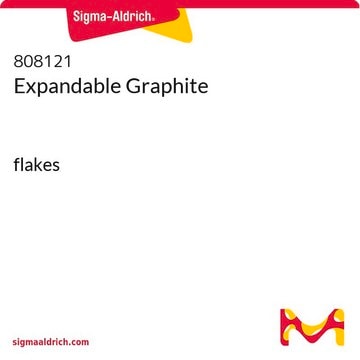496588
Graphite
powder, <150 μm, 99.99% trace metals basis
Sign Into View Organizational & Contract Pricing
All Photos(2)
About This Item
Empirical Formula (Hill Notation):
C
CAS Number:
Molecular Weight:
12.01
EC Number:
MDL number:
UNSPSC Code:
12352103
PubChem Substance ID:
NACRES:
NA.23
Recommended Products
grade
battery grade
Quality Level
Assay
99.99% trace metals basis
form
powder
mol wt
Mw 12.011 g/mol
composition
C
particle size
<150 μm
mp
3652-3697 °C (lit.)
density
2.26 g/cm3 (lit.)
application(s)
battery manufacturing
SMILES string
[C]
InChI
1S/C
InChI key
OKTJSMMVPCPJKN-UHFFFAOYSA-N
Looking for similar products? Visit Product Comparison Guide
Storage Class Code
11 - Combustible Solids
WGK
nwg
Flash Point(F)
Not applicable
Flash Point(C)
Not applicable
Personal Protective Equipment
dust mask type N95 (US), Eyeshields, Gloves
Choose from one of the most recent versions:
Already Own This Product?
Find documentation for the products that you have recently purchased in the Document Library.
Customers Also Viewed
R Hanoa
Scandinavian journal of work, environment & health, 9(4), 303-314 (1983-08-01)
Six hundred and five cases of graphite pneumoconiosis have been reported in the literature. In 39 cases the diagnosis was based on or supported by autopsy or lung biopsy results. Only 14 of the 39 cases were presented with relatively
M A Pimenta et al.
Physical chemistry chemical physics : PCCP, 9(11), 1276-1291 (2007-03-10)
Raman spectroscopy has historically played an important role in the structural characterization of graphitic materials, in particular providing valuable information about defects, stacking of the graphene layers and the finite sizes of the crystallites parallel and perpendicular to the hexagonal
Craig E Banks et al.
Analytical sciences : the international journal of the Japan Society for Analytical Chemistry, 21(11), 1263-1268 (2005-12-02)
The recent development, behavior and scope of edge plane pyrolytic graphite electrodes in electroanalysis are overviewed. Similarities to, and advantages, over multi-walled CNT modified electrodes are noted and the wide scope of applications, ranging through gas sensing, stripping voltammetry and
Stephanie Reich et al.
Philosophical transactions. Series A, Mathematical, physical, and engineering sciences, 362(1824), 2271-2288 (2004-10-16)
We present a review of the Raman spectra of graphite from an experimental and theoretical point of view. The disorder-induced Raman bands in this material have been a puzzling Raman problem for almost 30 years. Double-resonant Raman scattering explains their
PingHeng Tan et al.
Philosophical transactions. Series A, Mathematical, physical, and engineering sciences, 362(1824), 2289-2310 (2004-10-16)
Planar graphite has been extensively studied by Raman scattering for years. A comparative Raman study of several different and less common non-planar graphitic materials is given here. New kinds of graphite whiskers and tubular graphite cones (synthetic and natural) have
Our team of scientists has experience in all areas of research including Life Science, Material Science, Chemical Synthesis, Chromatography, Analytical and many others.
Contact Technical Service







